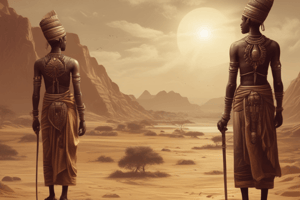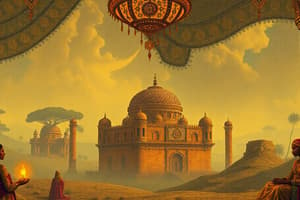Podcast
Questions and Answers
Describe the significance of the Berlin Conference in the context of the Scramble for Africa.
Describe the significance of the Berlin Conference in the context of the Scramble for Africa.
The Berlin Conference (1884-85) divided Africa among European powers, establishing borders and spheres of influence, marking the beginning of European colonization of Africa.
What was the significance of Mansa Musa's pilgrimage to Mecca in the 14th century?
What was the significance of Mansa Musa's pilgrimage to Mecca in the 14th century?
Mansa Musa's pilgrimage to Mecca in the 14th century showcased the wealth and power of the Mali Empire, demonstrating its importance as a center of trade and commerce.
Compare and contrast the Kingdom of Kush and Ancient Egypt.
Compare and contrast the Kingdom of Kush and Ancient Egypt.
The Kingdom of Kush was a rival of Ancient Egypt, with both sharing similarities in pyramids and pharaonic dynasties, but Kush was located in present-day Sudan and was known for its unique culture and architectural achievements.
What role did the Axum Empire play in the spread of Christianity in Africa?
What role did the Axum Empire play in the spread of Christianity in Africa?
Describe the significance of Sundiata Keita in West African history.
Describe the significance of Sundiata Keita in West African history.
Flashcards
Ancient Egypt
Ancient Egypt
Ancient civilization known for pyramids, mummies, and hieroglyphics along the Nile River.
Nubia (Kingdom of Kush)
Nubia (Kingdom of Kush)
An empire located in present-day Sudan, known for its rivalry with Ancient Egypt and pyramids at Meroe.
Axum Empire
Axum Empire
An empire located in present-day Ethiopia and Eritrea, a major center of trade, and introduced Christianity to Africa.
Ghana Empire
Ghana Empire
Signup and view all the flashcards
Scramble for Africa
Scramble for Africa
Signup and view all the flashcards
Study Notes
Ancient Africa
- Ancient Egypt (3100 BCE - 30 BCE):
- Pyramids, mummies, and hieroglyphics
- Pharaonic dynasties: Old Kingdom, Middle Kingdom, New Kingdom
- Important figures: Ramses II, Hatshepsut, Thutmose III
- Nubia (2000 BCE - 300 CE):
- Located in present-day Sudan
- Kingdom of Kush, rival of Ancient Egypt
- Pyramids at Meroe, Jebel Barkal
- Axum Empire (1st century CE - 700 CE):
- Located in present-day Ethiopia and Eritrea
- Major center of trade and commerce
- Introduced Christianity to Africa
Medieval Africa
- Ghana Empire (300 - 1200 CE):
- Located in present-day Mali and Senegal
- Major center of trade and commerce
- Known for gold production and trans-Saharan trade
- Mali Empire (1200 - 1500 CE):
- Founded by Sundiata Keita
- Expanded Ghana Empire, included present-day Mali, Senegal, and Gambia
- Famous for Mansa Musa's pilgrimage to Mecca
- Songhai Empire (1464 - 1591 CE):
- Located in present-day Mali, Senegal, and Mauritania
- Expanded Mali Empire, included present-day Burkina Faso and Niger
- Famous for Sunni Ali Ber and Askia the Great
Colonial and Modern Africa
- Scramble for Africa (1881 - 1914 CE):
- European colonization of Africa
- Berlin Conference (1884-85) divided Africa among European powers
- Nationalist Movements (1940s - 1960s CE):
- Independence movements across Africa
- Notable figures: Kwame Nkrumah (Ghana), Julius Nyerere (Tanzania), Nelson Mandela (South Africa)
- Modern Africa (1960s CE - present):
- Ongoing challenges: poverty, political instability, economic development
- Progress in democracy, human rights, and economic growth
Ancient Africa
- Ancient Egypt: Lasted from 3100 BCE to 30 BCE, characterized by pyramids, mummies, and hieroglyphics, with three main pharaonic dynasties: Old Kingdom, Middle Kingdom, and New Kingdom.
- Notable figures of Ancient Egypt include Ramses II, Hatshepsut, and Thutmose III.
- Nubia: Located in present-day Sudan, lasted from 2000 BCE to 300 CE, and was known for the Kingdom of Kush, which rivalled Ancient Egypt.
- Nubia was home to pyramids at Meroe and Jebel Barkal.
- Axum Empire: Spanned from 1st century CE to 700 CE, located in present-day Ethiopia and Eritrea, and was a major center of trade and commerce.
- Axum Empire introduced Christianity to Africa.
Medieval Africa
- Ghana Empire: Lasted from 300 to 1200 CE, located in present-day Mali and Senegal, and was a major center of trade and commerce.
- Ghana Empire was known for its gold production and trans-Saharan trade.
- Mali Empire: Founded by Sundiata Keita, lasted from 1200 to 1500 CE, and expanded the Ghana Empire to include present-day Mali, Senegal, and Gambia.
- Mali Empire was famous for Mansa Musa's pilgrimage to Mecca.
- Songhai Empire: Lasted from 1464 to 1591 CE, located in present-day Mali, Senegal, and Mauritania, and expanded the Mali Empire to include present-day Burkina Faso and Niger.
- Songhai Empire was famous for Sunni Ali Ber and Askia the Great.
Colonial and Modern Africa
- Scramble for Africa: A period of European colonization of Africa from 1881 to 1914 CE, marked by the Berlin Conference (1884-85) which divided Africa among European powers.
- Nationalist Movements: Independence movements across Africa from the 1940s to 1960s CE, notable figures include Kwame Nkrumah (Ghana), Julius Nyerere (Tanzania), and Nelson Mandela (South Africa).
- Modern Africa: Challenges since the 1960s CE include poverty, political instability, and economic development, but there has been progress in democracy, human rights, and economic growth.
Studying That Suits You
Use AI to generate personalized quizzes and flashcards to suit your learning preferences.




